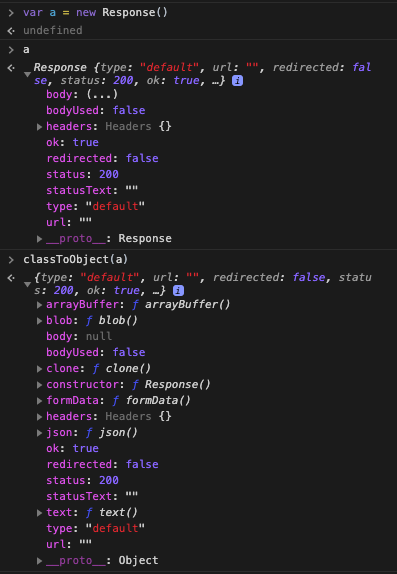I want to convert an instance class to plain object, without losing methods and/or inherited properties. So for example:
class Human {
height: number;
weight: number;
constructor() {
this.height = 180;
this.weight = 180;
}
getWeight() { return this.weight; }
// I want this function to convert the child instance
// accordingly
toJSON() {
// ???
return {};
}
}
class Person extends Human {
public name: string;
constructor() {
super();
this.name = 'Doe';
}
public getName() {
return this.name;
}
}
class PersonWorker extends Person {
constructor() {
super();
}
public report() {
console.log('I am Working');
}
public test() {
console.log('something');
}
}
let p = new PersonWorker;
let jsoned = p.toJSON();
jsoned should look like this:
{
// from Human class
height: 180,
weight: 180,
// when called should return this object's value of weight property
getWeight: function() {return this.weight},
// from Person class
name: 'Doe'
getName(): function() {return this.name},
// and from PersonWorker class
report: function() { console.log('I am Working'); },
test: function() { console.log('something'); }
}
Is this possible to achieve, and if so, how?
In case you're wondering, I need this because I am using a framework that, unfortunately, accepts as input only an object, whereas I am trying to use TypeScript and class inheritance.
Also, I am doing the above conversion once so performance isn't an issue to consider.
The solutions consisting of iterating through object properties will not work if the compiler's target option is set to es6. On es5, the existing implementations by iterating through object properties (using Object.keys(instance)) will work.
So far, I have this implementation:
toJSON(proto?: any) {
// ???
let jsoned: any = {};
let toConvert = <any>proto || this;
Object.getOwnPropertyNames(toConvert).forEach((prop) => {
const val = toConvert[prop];
// don't include those
if (prop === 'toJSON' || prop === 'constructor') {
return;
}
if (typeof val === 'function') {
jsoned[prop] = val.bind(this);
return;
}
jsoned[prop] = val;
const proto = Object.getPrototypeOf(toConvert);
if (proto !== null) {
Object.keys(this.toJSON(proto)).forEach(key => {
if (!!jsoned[key] || key === 'constructor' || key === 'toJSON') return;
if (typeof proto[key] === 'function') {
jsoned[key] = proto[key].bind(this);
return;
}
jsoned[key] = proto[key];
});
}
});
return jsoned;
}
But this is still not working. The resulted object includes only all the properties from all classes but only methods from PersonWorker.
What am I missing here?


toJSON() {return Object.keys(this).reduce((obj, key) => {obj[key] = this[key]; return obj;}, {});}– Catrones6via babel or node 4+ the old method withObject.keysdoesn't work – SporrantoJSONis also a special method name, used byJSON.stringifyif present to get the string representation of an object. – Winterize